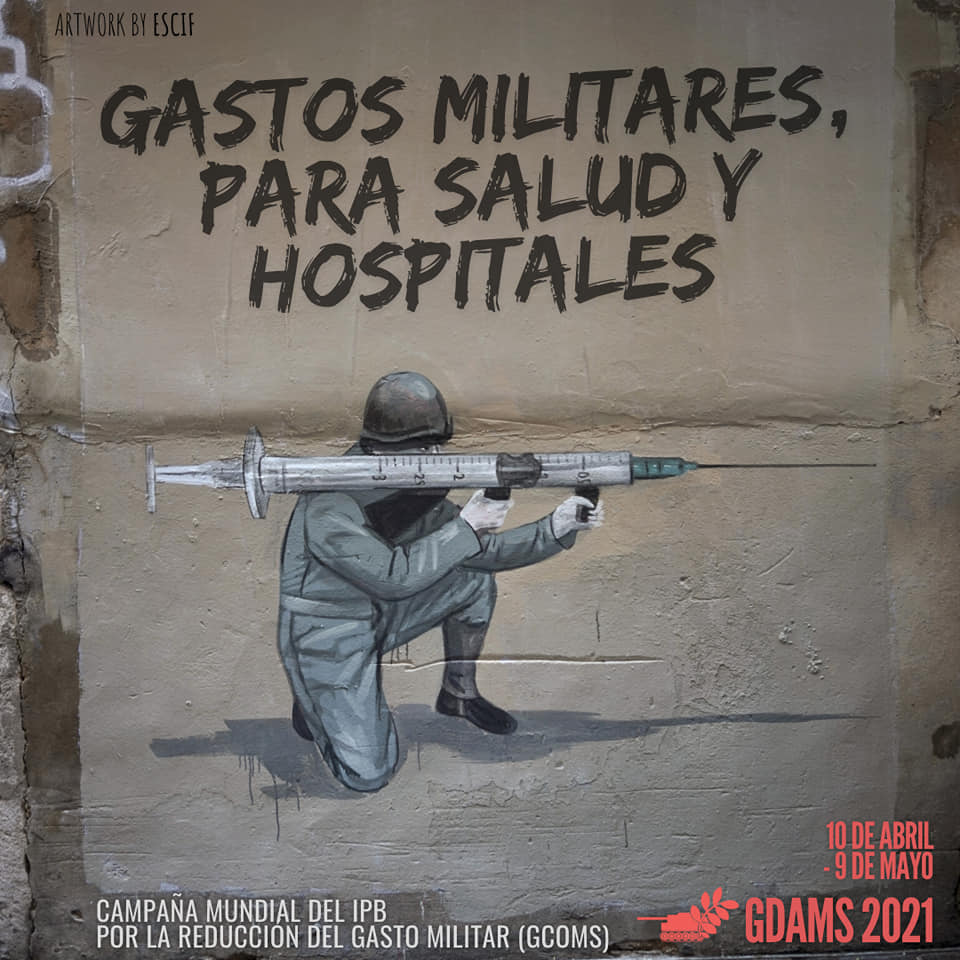Human Security: More Hospitals, Less Tanks
Javier Raboso – Greenpeace España
Orginally published here (in Spanish).
This week, the Stockholm International Peace Research Institute (SIPRI) has released new global military spending figures for 2020, which show an upward trend for the seventh year in a row, reaching $1.98 trillion, a 2.6% increase from 2019. This means that the world’s governments have spent almost $2 trillion to buy weapons and build up armies, in a year marked by the global health emergency resulting from the Covid-19 pandemic.
Globally, the five countries that lead the ranking in military spending are, in this order, the United States, China, India, Russia and the United Kingdom, which together account for 62% of global military spending. If we analyze the total military spending of NATO member countries, this amounts to 1.1 trillion dollars, 56% of the world’s military spending. And if we focus on the countries of the European Union, the sum amounts to 233 billion, 12% of the world total, second only to the United States and China.
In relation to Spain’s data, the report places us among the 20 countries with the highest military spending, with a figure of 17,400 million euros. This represents a slight decrease of 0.6% with respect to the previous year, but much less than the decrease in GDP, around 11%. In any case, according to the calculations of the Centre Delàs, the budget of the Spanish government presented for 2021 reflects an alarming increase of more than 10% in the Spanish military budget, setting a new historical record in the midst of the crisis caused by the pandemic. To get an idea of the direction of these budgets, it is worth noting that the military R&D budget is three times that of healthcare R&D (861 million compared to 287 million).

By relying on a national security based on rearmament and the constant growth of armies, the world’s governments are not responding adequately to the main problems affecting people’s security, which have more to do with health and livelihoods than ever before. For example, India is now the third largest military spender in the world, and its population is currently stretched to the limit by the lack of respirators. However, there are some positive examples such as Chile and South Korea, which have substantially reduced their military spending and which, coincidentally -or not-, are two of the countries that are better managing the health crisis resulting from the pandemic.
Only by reducing military spending will we be able to address the current challenges that threaten human security. The ecological transition, the global distribution of vaccines, global inequality or the strengthening of democracy and human rights need the huge amounts of resources that today are allocated to enrich the corporations of the military industrial complex.
For that reason, the International Peace Bureau and the organizations that promote GCOMS (Global Campaign on Military Spending), together with more than 140 organizations from over 30 countries, call on governments around the world to reduce their military spending and allocate these resources to address the health, ecological and social crises. We estimate that a 10% reduction in global military spending could finance universal education (Sustainable Development Goal 4) and 9% of such spending could finance climate change adaptation in ten years (according to estimates of the Global Center on Adaptation).
Stopping the spending on any type of armament for only 26 hours could help alleviate the hunger of 34 million people, and the military expenditures of European Union member States during the last four years could finance the Green New Deal for the entire continent.
It is time to engage in a social debate on the resources we allocate to the military. We need to redefine what security means for the majority of the planet’s inhabitants, and decide whether, in a context of health emergency and ecosocial crisis, this security is provided by tanks or by health centers. Our lives depend on it.
What does security mean to you?



